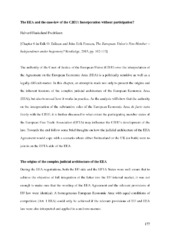The EEA and the case law of the CJEU: Incorporation without participation?
Chapter, Peer reviewed
Accepted version

Åpne
Permanent lenke
https://hdl.handle.net/1956/16688Utgivelsesdato
2015Metadata
Vis full innførselSamlinger
- Faculty of Law [2624]
Sammendrag
The authority of the Court of Justice of the European Union (CJEU) over the interpretation of the Agreement on the European Economic Area (EEA) is a politically sensitive as well as a legally difficult matter. In this chapter, an attempt is made not only to present the origins and the inherent tensions of the complex judicial architecture of the European Economic Area (EEA), but also to reveal how it works in practice. As the analysis will show that the authority on the interpretation of the substantive rules of the European Economic Area de facto rests firmly with the CJEU, it is further discussed to what extent the participating member states of the European Free Trade Association (EFTA) may influence the CJEU’s development of the law. Towards the end follow some brief thoughts on how the judicial architecture of the EEA Agreement would cope with a scenario where either Switzerland or the UK (or both) were to join in on the EFTA side of the EEA.